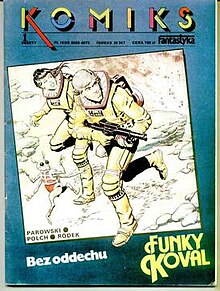Funky Koval
| Funky Koval | |
|---|---|
| Created by | Jacek Rodek Maciej Parowski Bogusław Polch |
| Publication information | |
| Publisher | Fantastyka |
| Original language | Polish |
| Genre | |
| Publication date | 1982–2010 |
| Reprints | |
| The series has been reprinted, at least in part, in Hungarian and Czech. | |

Funky Koval is a Polish
Development
The initial
The first episodes were more of the independent 'comic short story' format, as the writers wanted to experiment with different ideas. After the first two short stories were published, the comic moved to more lengthy, novel-like plots, following urging by Polch who argued for more consistency.[1][4]
Release history
The comic debuted in November 1982 on four
In 1987, the comics were released in albums, colored and with some additional panels to allow easier transition between various stories. The first album, Bez oddechu (Breathless) contained collected the episodic stories published in Fantastyka in 1982-1983. The second, Sam przeciw wszystkim (Alone against everyone), released in 1988, collected the stories published in Fantastyka in 1985-1986; and the third, Wbrew sobie (Against oneself), released in 1992, the ones from 1991-1992, published in Nowa Fantastyka (a successor magazine to Fantastyka).[1][2][3]
Gossip and semi-official promises about that new parts of the comics have been circulating for many years.
The first two albums were released in the
The first album was also translated to Hungarian (in 1986).[6][12] There was also a Czech translation.[4][6]
Art

A notable feature of the comic is the art of
The art in the third series is different from that in the first two: in the third series Polch experimented with more simple style, sometimes bordering on caricatures. This change proved to be a disappointment to some fans used to his earlier, more detailed and realistic style.[1][2]
Plot summary

The plot resolves around the figure of former military pilot and now space detective, Funky Koval, who with his friends and colleagues forms a private detective agency "Universs" and solves various cases in the futuristic world of the 2080s. His investigations range from corruption in the police and government, through fighting cultists and terrorists, investigating missing spaceships and illegal slave camps, to the mystery of the Drolls aliens, who have a much more advanced technology than the humans, and whose plans for the humanity - if any - remain a mystery.[1][2][13]
Reception and cultural impact
At first, the reception of the comic was lukewarm, with many readers of Fantastyka questioning whether the magazine should devote space to a comic. After some initial misgivings, however, the series became highly popular.
In 2010, Tomasz Kołodziejczak, also discussing the series in Nowa Fantastyka, called it "a great comic", nothing that the story holds well even after twenty years, and it certainly would benefit from being continued.[16]
Related media
In 1985 Parowski published a short story featuring Koval, Ostatnia przygoda Funky'ego (Funky's Last Aventure), in an anthology of his short stories, Sposób na kobiety.[17]
In 2003 a parody comic, Franky Krova ("Franky Kow") was published (written by Tobiasz Piątkowski and drawn by Robin Adler).[18]
In 2008 Polch told the press than an American producer that has bought the rights to the trilogy. The movie is based on Bez Oddechu.[13][19][20] In 2011 it was announced that the movie is to be produced by Josi W. Konski and Roland von Ciel with a $37 million budget, with the planned release as early as 2012.[15] The planned title was Adventures of Funky Koval, and among the considered actors were Matthew McConaughey and Borys Szyc.[21]
See also
References
- ^ a b c d e f g h i j k l Centarowski, Michał (2007). "Punky Rock is not dead". Nowa Fantastyka (in Polish). Vol. 300, no. 9.
- ^ ISBN 978-83-7009-423-2.
- ^ ISBN 978-83-237-9603-9.
- ^ ISBN 978-83-929377-3-9. Archived from the originalon 2020-11-30.
- ^ ""Funky Koval"". KZ - magazyn miłośników komiksu. November 2002. Retrieved 2022-06-08.
- ^ ISBN 978-83-921387-0-9. Archived from the originalon 2020-11-30.
- ^ "Wrogie przejęcie - FunkyKoval.pl". mdgdata.home.pl. Retrieved 2022-06-08.
- ^ Koziński, Miłosz (2011-11-24). ""Funky Koval" tom 4: "Wrogie przejęcie" - recenzja". Paradoks (in Polish). Retrieved 2022-06-08.
- ^ "Na białym szumie - FunkyKoval.pl". mdgdata.home.pl. Retrieved 2022-06-08.
- ISBN 978-83-7009-423-2.
- ^ Lengyel, Balint (6 November 2014). "Funky Koval - Wydanie kolekcjonerskie. Kosmiczny detektyw nadal jest wielki (recenzja)". POLTERGEIST (in Polish). Retrieved 2022-06-08.
- ISBN 978-83-7009-423-2.
- ^ a b "Amerykanie zekranizują przygody Funky Kovala". Gildia.pl (in Polish). 13 September 2008. Archived from the original on 2015-10-31. Retrieved 2022-06-07.
- ISSN 1427-549X.
...uważanej za najlepszy polski komiks (nie tylko fantastycznonaukowy, ale ogólnie na tle wszystkich polskich dokonań w tej dziedzinie), stworzonej w latach 80. XX wieku wspólnie z Jackiem Rodkiem serii o kosmicznym detektywie noszącym nazwisko Funky Koval...
- ^ a b Latek, Katarzyna (13 March 2011). "Kultowy komiks czeka ekranizacja" [Screen adaptation of cult comic waiting]. Puls Biznesu (in Polish). Archived from the original on 14 March 2011. Retrieved 25 March 2011.
- ^ Kołodziejczak, Tomasz (2010). "Dawaj go tutaj, Brenda!". Nowa Fantastyka (in Polish). Vol. 337, no. 10.
- ^ "Sposób na kobiety – encyklopediafantastyki.pl". encyklopediafantastyki.pl. Retrieved 2022-06-12.
- ^ Yoghurt; Yaqza (2004-06-28). "Prawie 48 stron: Franky Krova". Aleja Komiksu (in Polish). Retrieved 2022-06-12.
- ^ "Poland's cult scifi/detective comic FUNKY KOVAL getting adapted". Quiet Earth. 10 May 2009. Retrieved 2022-06-07.
- ^ "Funky Koval idzie do kina". Aleja Komiksu (in Polish). 2008-09-13. Archived from the original on 2017-11-07. Retrieved 2022-06-07.
- ^ "ekranizacja". FunkyKoval.pl. 2020-11-30. Archived from the original on 2020-11-30. Retrieved 2022-06-12.
External links
- (in Polish) "Klasyka polskiego komiksu: Funky Koval" - review
- (in Polish) Kosmiczny Detektyw - review
- (in Polish) Funky Koval - review
- (in Polish) FUNKY KOVAL ŻYJE! - article from Świat Komiksu 29, wrzesień 2002
- (in Polish) Mam mnóstwo własnych pomysłów - Interview with Polch
- (in Polish) "Official Fansite"
- Funky Koval Movie website
- "IMDB "
